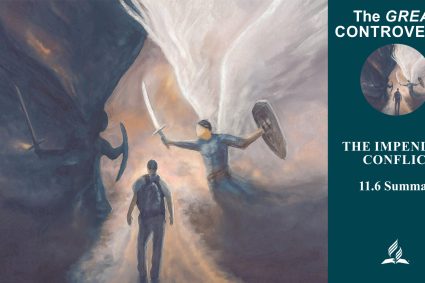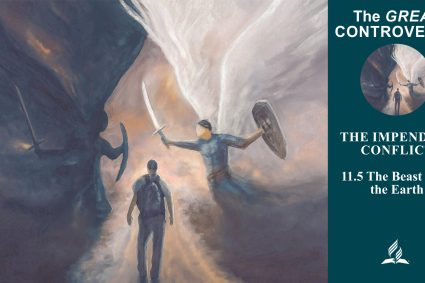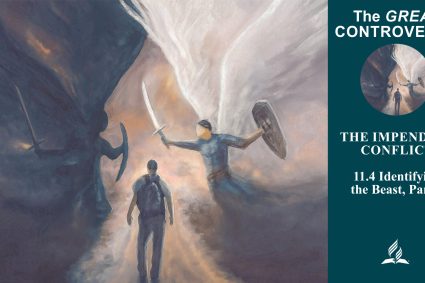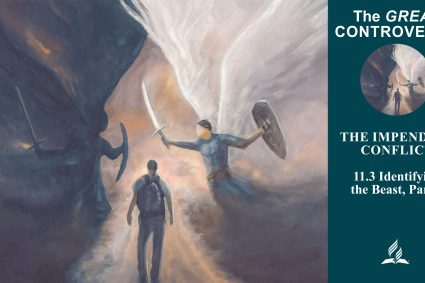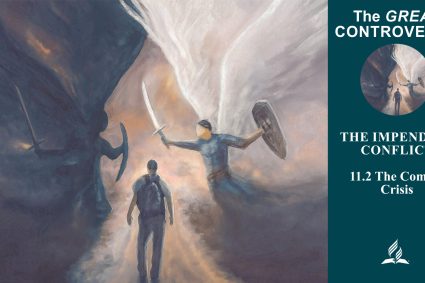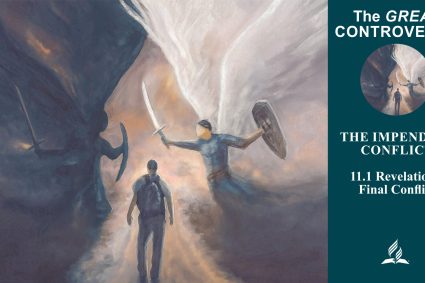

4.5 Cheered by Hope
Hope in the Darkness: God’s Unshakable Promises
Read Hebrews 2:14–15. How did believers in the Middle Ages experience the reality of the Great Controversy?
Hebrews 2:14–15 reads:
“Since the children have flesh and blood, he too shared in their humanity so that by his death he might break the power of him who holds the power of death—that is, the devil—and free those who all their lives were held in slavery by their fear of death.”
Believers in the Middle Ages, especially the Waldensians, experienced the reality of the Great Controversy very directly and intensely. They often faced persecution, torture, and death for holding onto their beliefs and refusing to apostatize from the Roman Church. These believers lived in a time of intense spiritual and political conflicts, where death and persecution were omnipresent realities.
Despite the severe persecutions, the Waldensians and other reformers like Hus, Jerome, Tyndale, and Latimer were encouraged by their deep faith in God’s promises. They were convinced of Jesus’ promise in John 14:19, “Because I live, you also will live.” This promise gave them the assurance that Christ, who conquered death, was with them and would strengthen and comfort them in their sufferings.
The believers of the Middle Ages found comfort and joy in fellowship with Christ, especially in his sufferings. They understood that death was defeated through the resurrection of Christ and that, although they might physically die, they would have eternal life and victory over death through Christ. Their faithfulness and steadfastness, even under the cruelest circumstances, were a powerful testimony to their deep relationship with God and their faith in his promises.
Overall, the history of these courageous men and women shows that faith in God’s promises and fellowship with Christ can provide comfort, hope, and joy even amidst life’s greatest trials and sufferings. They remind us that no matter what challenges we encounter in life, we can rely on God’s promises and find strength and victory in fellowship with Christ.
Read John 5:24; 11:25–26, and 1 John 5:11–13. What assurances do these promises give you? How can they help us in the trials of life?
These promises offer us the following assurances:
1. Eternal life through faith: John 5:24 emphasizes that whoever hears Jesus and believes in God has eternal life and will not come under judgment. This gives us the certainty that through our faith in Jesus Christ and the Gospel, we will have eternal life with God.
2. Resurrection and eternal life: In John 11:25–26, Jesus assures us that he is the resurrection and the life. He emphasizes that even if we physically die, we will live through our faith in him and will never die. This gives us hope beyond death and the assurance of eternal communion with God.
3. Certainty of eternal life: 1 John 5:11–13 assures us that God has given us eternal life through his Son. Whoever has Jesus has life. This gives us the security and certainty that if we believe in Jesus, we already have eternal life.
In the trials of life, these promises can offer us comfort, hope, and strength. They remind us that our life is firmly anchored in Christ and that nothing can separate us from his love and care. The story of Jan Hus is a powerful example of someone who, despite severe suffering and trials, was strengthened by the peace and grace of God. Similarly, if we rely on God’s promises and trust in them, we can find peace, comfort, and hope in the midst of our own challenges. God’s promises are timeless and still provide us with a solid foundation for our faith and life today.
What could it mean to lose everything for Christ? What do you truly lose in the end? (See Mk 8:36) What can we learn from the Waldensians and the Reformers that can sustain us in the final conflict on earth?
In Mark 8:36, Jesus says, “For what does it profit a man to gain the whole world and forfeit his soul?”
When it comes to losing everything for Christ, it means being willing to give up or sacrifice everything one has or values – whether it be wealth, status, relationships, or even one’s own life – to remain faithful to Jesus and his Gospel. It is a radical commitment and deep devotion to Christ, where one is willing to make personal sacrifices to follow God’s will.
What do you truly lose in the end? In light of Mark 8:36, it becomes clear that it’s not just material possessions that one could lose, but above all, one’s own soul. This means that by turning away from God and his ways or abandoning his principles, one jeopardizes the deepest and most important dimension of their being.
From the Waldensians and the Reformers, we can learn:
1. Steadfastness in faith: Despite persecution, suffering, and the risk of death, the Waldensians and the Reformers remained steadfast in their faith. Their determination and courage can inspire us to stand firm in our own faith, even when facing challenges or persecution.
2. Priority of the Word of God: Both groups placed great emphasis on the Bible as the sole authority for faith and practice. Their dedication to studying and spreading the Holy Scriptures reminds us of the importance of relying on God’s Word and anchoring it in our lives.
3. Community and support: The Waldensians and the Reformers sought community and support from like-minded individuals. In times of trial and persecution, they found strength and comfort in the fellowship of believers. This teaches us the importance of community in faith and how crucial it is to encourage and support one another.
4. Trust in God’s promises: Both groups firmly trusted in God’s promises, especially in times of trial and persecution. Their confidence and hope in God’s promises can encourage us and remind us that God’s Word and promises are our secure foundation and comfort in all circumstances.
In summary, we can learn from the Waldensians and the Reformers that a deeply rooted faith in God, a strong community in faith, a solid foundation in God’s Word, and an unwavering trust in God’s promises can sustain us in the challenges and conflicts of life.
The connection between these deep principles of faith and our everyday lives is essential. In a world often characterized by uncertainty, trials, and challenges, we can learn much from the examples of the Waldensians and the Reformers.
1. Priority of God’s Word in daily life: In a time when we are inundated with information, opinions, and distractions, it is important to invest time in God’s Word. Through regular reading, studying, and meditating on the Bible, we can sharpen our perspective, grow spiritually, and anchor truth in our daily lives.
2. Community and support: Building and maintaining strong, supportive communities are crucial in everyday life. In times of joy, but especially in times of need, we can strengthen, encourage, and comfort each other. This creates a sense of belonging and gives us the assurance that we are not alone.
3. Trust in God’s promises: Our hope and trust should not be based on circumstances or human promises, but on God’s unshakable promises. In the highs and lows of life, we can rely on his faithfulness, love, and guidance.
4. Willingness to give everything for Christ: In everyday life, this means being willing to align our priorities, decisions, and actions with the principles and example of Jesus. It often requires courage, determination, and sacrifice, but the reward is a deeper relationship with God and a more fulfilling life.
In summary, the principles and teachings of the Waldensians and the Reformers can provide us with guidance, hope, and strength in everyday life. By relying on a deeply rooted faith, community, God’s Word, and his promises, we can face life’s challenges with confidence, peace, and steadfastness. It is a constant reminder that our faith is not only relevant for Sunday worship or special occasions but for every moment of our daily lives.
In the midst of life’s greatest trials, the hope of God’s promises gives us the strength and courage to remain steadfast.
(Visited 14 times, 1 visits today)













